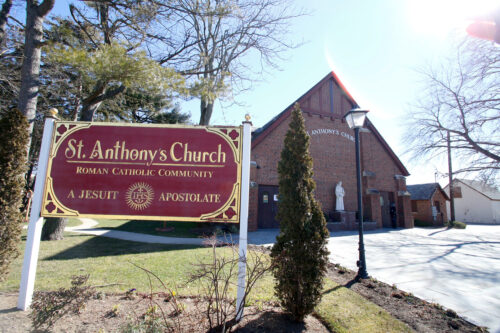Several years ago, I was introduced to a family who was visiting a fellow Jesuit who lived in our community. Both parents were graduates of a Jesuit high school and they were accompanied by their daughter and son. The family seemed to be a perfectly happy one; the daughter resembled the father, while the son looked like his mother.
A few months after the visit, the mother asked to consult with me regarding her daughter. She couldn’t understand her daughter, who had just graduated and was working overseas. After arranging a time, I met both parents in a guest room in our Jesuit residence.
The mother was afraid that she might lose her daughter.
After listening to her describe her relationship with her daughter, I realized it was difficult for the mother to admit that her daughter was a lesbian. Even though the daughter came out to her parents and shared her experiences in discovering her sexuality, the mother refused to accept and believe her daughter’s identity. The mother even suggested that perhaps her daughter was hanging out with the wrong crowd. She said that her daughter had a passion for social justice, and perhaps she was empathizing too much with sexual minorities who had “infected” her.
What the mother said hurt her daughter’s feelings. After a series of heated arguments between the two, their relationship became cold. The mother became confused and was concerned that she might lose her daughter. She hoped that as a young Jesuit, I could bring her “prodigal” daughter back to her senses.
This put me in a difficult situation; the mother expected me to be a mediator, even though I need to be neutral and withhold any moral opinions. Who am I to judge?
Finally, after contacting her daughter via Instagram, I learned about the struggle she had to go through to understand her sexual identity.
For heterosexual, cisgender people, who are considered “the norm” by society, it might be difficult to accept the fact that there are people who have various sexual identities.
Heterosexual, cisgender people might assume that everyone around them shares the same sexual identity. For them, the “normal” human being is the one who is exclusively attracted to the opposite sex. If they were to say that heterosexuality is natural, then every person who is different would defy nature itself. On the other hand, an LGBTQ person living in a heterosexual world might feel out of place, and even depressed, since they could not match their sexual orientation to the “norm.”
This is a serious problem, since many of those who identify as queer are encouraged to go through “conversion therapies” that are offered by numerous institutions. But what is supposedly designed to “cure” often makes things worse. You can never “cure” sexual orientation, let alone sexual attraction.
“For the heterosexual, cisgender person, who are considered ‘the norm’ and the majority by society, it might be difficult to accept the fact that there are people who have various sexual identities.”
Queer people may try to hide from themselves, and other people, by appearing to be “normal.” In extreme cases, many of them choose to end their own lives. But in some cases, they have chosen to live a life that is not their own true self. Those who chose to appear as their true selves may live a life of constant struggle against those who would not accept them.
Indonesians in general don’t accept the LGBTQ community. In a survey conducted by the Pew Research Center in 2019, only 9 percent of Indonesians said they accepted homosexuals.
Sexual orientation, unfortunately, is not something that can be picked up by a person’s outward appearance. If only this could be identified by skin color, hair texture, or even a birthmark, perhaps it would make it easier for people to understand that sexual orientation is as natural as a person can be.
Despite this, the reality of sexual identities is something that cannot be denied by the person who experiences it. Unfortunately, some people claim that non-normative sexual identities are an egotistical choice made to follow some sort of “trendy” lifestyle.
Both perspectives, from the mother and the daughter, had their own complexities. This made it difficult for me to build a bridge between mother and daughter without the help of a mediator. The only hope that they have is the familial ties that they share. However, it’s not ideal if one refuses to understand the other.
Indonesians in general don’t accept the LGBTQ community. In a survey conducted by the Pew Research Center in 2019, only 9 percent of Indonesians accept homosexuals.
The fear evoked by negative stereotypes towards the LGBTQ community had overwhelmed the daughter’s need to be understood. The mother feared that her daughter might live a sad and lonely life. Perhaps she believes that queer people cannot have a healthy and fulfilling life. They could always adopt or conceive through medical technologies, but are they able to care and nurture their children?
This fear, however, came from a lack of perspective. She was afraid that her daughter would never be happy or have a dignified life. It is this perspective that needs to be changed. If the mother were to hold her ground, her daughter would actually never find happiness or, in extreme cases, completely disappear from her family.
It is unfortunate that most anti-homosexual rhetoric is based on a few Bible passages taken out of context in order to label LGBTQ people as enemies of nature that need to be annihilated. However, if we believe that our God is a God of Love, isn’t that type of rhetoric incompatible with God’s compassion? People tend to forget that violence also happens verbally to countless children who are bullied just because they aren’t masculine or feminine enough. Words of hatred towards them have created an illusion that this world does not accept them as they are.
As Christians, we are called to follow Jesus and apply his teachings according to our own lives. Jesus has always pointed us towards the way of love and rebuked those who consider themselves holy. Jesus demonstrated the virtues of humility and openness towards those who were marginalized by his society, like tax-collectors and prostitutes.
“People tend to forget that violence also happens verbally to countless children who are bullied just because they aren’t masculine or feminine enough.”
Are we going to follow Jesus by applying his teachings only to a particular type of person? Jesus has been portrayed in the Bible as someone who allows people to speak for themselves and be understood as equals. He even met with and spoke to the naked demoniac who was feared by everyone (Mk 5: 1-20).
Unfortunately, LGBTQ people can end up like sheep separated from their own herds. In this loneliness, they have to seek for their own answers and discover other communities who accept them as they are. Those who aren’t part of this community may find it easier to remain silent or rebuke them, rather than allowing them to speak and be understood.
Perhaps as a church community we need to be like Jesus, who is always willing to understand those who are considered “abnormal.” Perhaps we are more interested in serving those who are “normal” since they won’t create any controversies.
But what would we do if the “abnormal” is someone a family member, or even, ourselves? Would we be willing to reach out and listen to those who are cast out by society?
This article originally appeared in Indonesian. You can find that version here.



